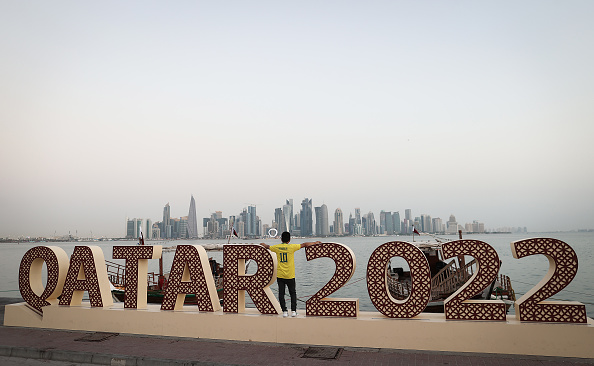‘Little difficulty’ proving Qatar booze deal breached, but top lawyers say it may not mean a legal row

Budweiser will have “little difficulty” proving there has been “breach of contract” after Qatar banned alcohol in stadiums for the World Cup, but top lawyers say it may not lead to a massive legal row.
The beer brand’s owners AB InBev were left in a state of shock this morning after Qatar announced booze would no longer be sold at grounds for the football competition which begins on Sunday.
This comes after a $100m+ contract was signed between Football’s governing body and AB InBev, giving them exclusive media and sales rights. It had been promised before the tournament there would be areas where fans could drink, with hundreds of thousands expected to descend on the country for the tournament.
Stephen Taylor Heath, Head of Sports Law at JMW Solicitors said while the beer-maker will “have little difficulty in arguing there is a substantive breach of contract”, it may not necessarily lead to a big legal row.
“FIFA has several arguments that it would use to seek to deflect a claim for damages” and “in reality it is most likely a settlement will be agreed provided AB InBev is satisfied with the substitute rights, reduction in fees or additional benefits it is granted by FIFA”, after the deal was breached.
He said a major problem for both Fifa and AB InBev, was “that the local law essentially outlaws beer consumption in public, therefore it would not be permitted in the stadium and would have been illegal were it not for the government’s dispensation which has now been withdrawn.”
They were both relying on an “exception” which Qatar has now pulled back on.
Taylor Heath said the likely outcome is AB InBev will “write a letter to FIFA” outlining its views, and whether “ it intends to seek damages and/or termination for material breach”.
The company “may also be able to leverage this situation” to get a better deal, for example with longer term rights.
Elaina Bailes, a committee member of the London Solicitors Litigation Association (LSLA), also weighed in, saying: “The fact that FIFA’s change in position is so last minute seems likely to lead to a dispute.”
“Budweiser now has a costly logistical problem of what to do with distributed stock it can no longer sell, and there could be knock on effects for contracts in their supply chain. Further, they will have lost some of the benefit of the sponsorship by no longer having brand visibility during the matches. So their losses are potentially huge.”
“Whether FIFA are entitled to do this will depend on the exact terms agreed. Given that FIFA must have been aware that they would need to be flexible given the cultural sensitivities of hosting the event in Qatar, the sponsorship contracts may have terms to cover what happens if the Qatari authorities intervene.”
“FIFA could argue they had no choice but to take this action to try and escape liability, though their public statement suggests it was a mutual agreement.”
Ed Weeks, Partner and Head of the CDR team at Cripps, added: “Whether or not there will be a dispute all depends on the terms of the contract between FIFA and Budweiser.
“The difficulty here is, no one outside those two parties knows what the terms of the contract are – it’s all confidential.
He added “in particular, the big question will be – did FIFA’s lawyers anticipate that Qatar might suddenly do this? If they did, and they put in a clause putting the risk on Budweiser, then they’re going to be very smug right now. If they didn’t, then FIFA and its lawyers are going to have a really bad weekend.”
Also commenting was David Mohyuddin KC, Barrister at Radcliffe Chambers, who said: “AB InBev will no doubt want redress for the sales lost now that alcohol will not be sold in the stadiums at the World Cup, viewing it as a major breach of contract. How far they get will likely depend on who made the decision and the precise wording of the contract. Awkward to say the least…”
While not having issued a statement yet, the global beer-making titan simply took to Twitter saying:
“Well, this is awkward.”
The tweet was subsequently deleted.

Owner of Budweiser, Anheuser-Busch InBev (AB InBev) told City A.M.: “As partners of FIFA for over three decades, we look forward to our activations of FIFA World Cup™ campaigns around the world to celebrate football with our consumers.”
“Some of the planned stadium activations cannot move forward due to circumstances beyond our control.”
The global footballing authority FIFA issued a statement on its website, which said: “Following discussions between host country authorities and FIFA, a decision has been made to focus the sale of alcoholic beverages on the FIFA Fan Festival, other fan destinations and licensed venues, removing sales points of beer from Qatar’s FIFA World Cup 2022 stadium perimeters.”
“There is no impact to the sale of Bud Zero which will remain available at all Qatar’s World Cup stadiums.”
“Host country authorities and FIFA will continue to ensure that the stadiums and surrounding areas provide an enjoyable, respectful and pleasant experience for all fans. The tournament organisers appreciate AB InBev’s understanding and continuous support to our joint commitment to cater for everyone during the FIFA World Cup Qatar 2022”.
With hundreds of millions set to watch the competition from around the world, it has been mired in controversy due to alleged human rights abuses in the country and deaths of migrant workers building stadiums.
Foreign Secretary James Cleverly also caused controversy when he appeared to ask LGBT fans to compromise their sexuality if travelling there, because same-sex relations are illegal in Qatar.
